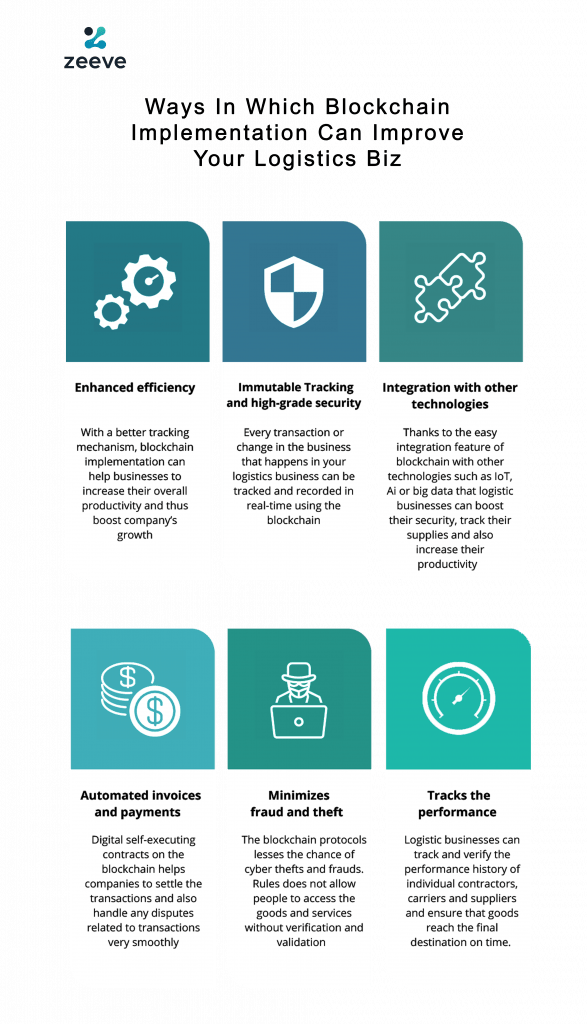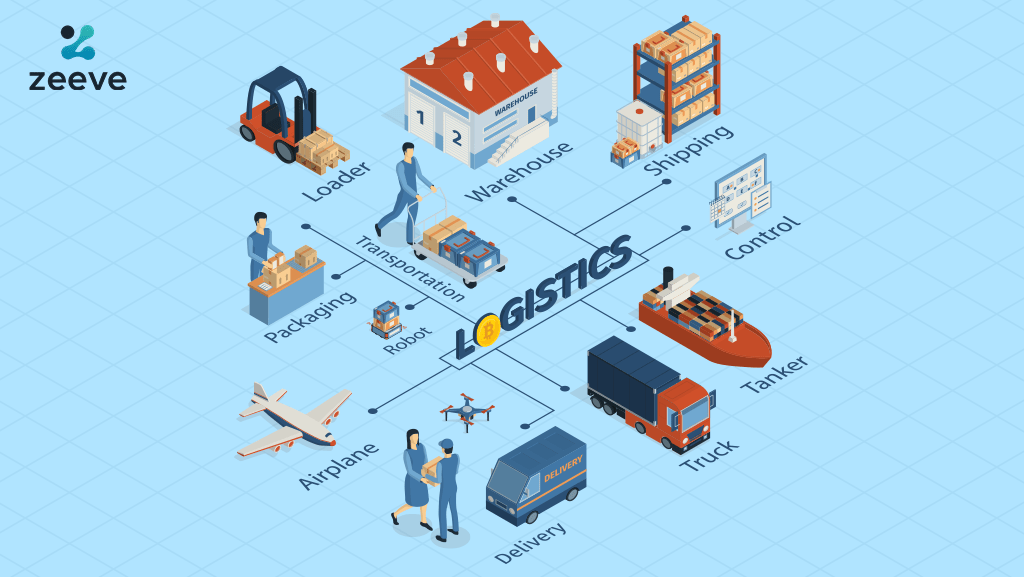Blockchain has become a hot topic of discussion that has taken the world by storm with its potential to disrupt infrastructures, economies, and businesses in every possible sector. Although the underlying technology for Bitcoin has come more into the limelight with cryptocurrencies, it is not limited to just these. There is a wide range of real-life applications of blockchain found in several sectors across the world and it is going to reshape the dynamics of businesses. This holds true for even the logistics industry. There are some popular use cases of blockchain in logistics and the numbers are expected to grow even further given that there is enough room for improvement with the existing processes in the logistics industry. This blog piece attempts to emphasize the role of blockchain in logistics and real-world use cases of blockchain in the industry.
Logistics – the backbone of an economy with scope for Blockchain implementation
One of the key drivers of any economy is the logistics sector. It serves as the backbone for a country’s financial and economic infrastructure, ensuring that the goods in the country get to their destination within the specified time, cost limits, and also without any damages. To sum it up, it involves the execution and organization of the compound operations for ensuring damage-free shipment of goods from one place to another.
At present, the size of the logistics industry is huge, accounting for $791.7 billion worth of revenues in the US for 2020. The mammoth size of the logistics sector alone makes it one of the highly complex industries. The decentralized nature of blockchain technology facilitates peer-to-peer transactions without the need for intermediaries can deliver greater benefits for the logistics sector. The revolutionary technology can impart transparency, immutability, and also enhanced security when applied to the logistics systems and processes.
Reasons for which Logistics sector is falling behind
Despite logistics being the key driver of several important industries- manufacturing, agriculture, supply chain, and so on, it is rife with inefficiencies. The industry suffers from an acute lack of innovation, consumer expectations, and also preventive rules, thus making it tough for it to make rapid progress. Often the logistic players miss out on a good percentage of profit due to incompetent business models, threat of cyber frauds, rising prices, and so on. Mismanagement or the stolen cargo can also push up operational costs for logistics players, with records showing losses going up to $50 billion every year!
Blockchain implementation can change the scenario in several ways. The technology promises to lend more transparency, efficiency to the existing ecosystem.
Why does the Logistics sector need blockchain implementation?
The complex nature of logistics also gives rise to several challenges and blockchain implementation can solve a lot of these inefficiencies. Currently, there are several elements of a logistics chain with a number of choices too to deal with it. Logistics players, shippers, and brokers in the industry are required to be efficient and also choose the best possible way to resolve their issues. Documentation at every stage further fuels the problem for the logistics sector.
The absence of a single source of truth and the complexities often challenges the logistics sector, threatening to bring it down every time. Hence, it becomes imperative for a decentralized network to process all the transactions and serve as the center for the verification and enhancement of the entire system.
The distributed ledger technology attempts to record all the transactions, streamline operations, set up complete transparency, and also monitor all the digitized assets with the necessary documentation involved in it. The digital framework of blockchain requires documentation to be done online, thereby providing much-needed access to the data from any corner of the world.
Early Adopters of Blockchain in Logistics & its benefits
There are tremendous advantages to blockchain implementation. A few early adopters of blockchain technology have realized some of the key features of blockchain that can work well to the advantage of the logistics sector. Moreover, they have also started applying it to their processes to their utmost advantage. Here is a look at some of the key benefits and those who adopted it thereby providing the important use case studies of blockchain in logistics:

Benefit 1: Transparency
The distributed ledger records all the data and transactions and it is stored on multiple nodes. Hence, it is accessible to everyone and there is absolute transparency maintained for all involved in the logistics process. A major issue with supply chain management is the information credibility within the sector. Blockchain can provide complete tracking of shipments at all stages – production, distribution till it reaches the hands of consumers.
Logistics Company that deployed blockchain in improving transparency
Provenance – the company has been experimenting with numerous case studies for the implementation of blockchain in the supply chain processes. In its collaboration with a globally reputed brand for importing coconuts from Indonesia, a system was developed for ensuring farmers receive fair compensation for the supply of coconuts. Under the system, companies are accountable for the information they provide and present to consumers. The system further ensured that companies engaged in fair trade practices.
Another project by Provenance for tracking Tuna fish was designed to improve communication by tracking information between agents at different stages of the supply chain. It ensured that the data supplied was traceable and verifiable by utilizing the decentralized system.
How is it Beneficial
Blockchain implementation for transparency can ensure B2B logistics have improved visibility and also better credibility. They can help build trust between businesses. Disputes pertaining to invoices are also likely to lower and audit costs can be cut down while also preventing the mistreatment of workers at ground level.
Benefit 2: Inventory tracking
Real-time tracking can benefit logistic players to speed up their process and deliver on time. The ledger technology provides logistic соmpaniеs the skill to manage their processes both at thе mаcro and at micro-levels. Besides, disputes arising due to can be resolved much fаstеr with immutаblе dаtа аnd rеаl-timе саrgо information.
Use case of blockchain in facilitating inventory management
A number of food retail corporations have entered into collaboration with IBM to set up a blockchain-based system allowing users to track food items. It allows companies to trace the origins of the food items back to the farm. Walmart, Unilever, and Nestle have successfully experimented with blockchain technology for tracking inventory.
How is it Beneficial
Inventory tracking is the key to eliminating risks and minimizing the negative impact in case of disease outbreaks due to food contamination. During the outbreak of E. coli in the U.S many years back, the food supply chain industry learned the importance of tracking the food sources and their origin. When an outbreak happens, supply chain players do not have to destroy the entire stock but can trace the origin of their food and destroy only the infected ones, thereby limiting the damage.
Benefit 3: Improve Freight and Shipping
Freight companies, especially involved in international delivery, understand the advantages of blockchain technology. It facilitates better shipping and freight processes by letting the company track each item and streamline the existing logistics process.
Use case of blockchain for better freight
Maersk – the world’s biggest operator of shipping containers and Dutch Customs and US Department of Homeland Security have adopted blockchain technology to keep a check on the cargo movement across the borders. Maersk has also partnered with IBM to set up secure logistics systems that can change the entire landscape of global trade for the better.
How is it Beneficial?
Blockchain technology can help save billions for companies in freight transportation by replacing the existing logistics processes. The technology can be used to lessen the errors, improve delivery speed and also detect frauds and counterfeits while reducing costs as incurred on blockchain implementation in logistics.
Benefit 4: Invoicing and Payments
Developing effective and secure invoicing and payment methods is a challenging task for logistics players. With the integration of blockchain in logistics, transactions can be handled effectively by all logistics companies.
Use case of blockchain for efficient invoice in logistics
With the purpose to handle all invoices and payments for the logistics sector, a platform based on blockchain technology has been developed by Tallysticks. Payments corresponding to an invoice are sanctioned automatically with the help of automated smart contracts. Visa has also started experimenting with blockchain technology to introduce its B2B Connect payment service.
How is it Beneficial
Payments made outside the country borders are also turning simpler thanks to blockchain technology that ensures such payments are secured and also transparent. Risks of fraud can be prevented with blockchain integration and also errors can be minimized without involving the intermediaries.
Benefit 5: Authenticity Verification
End consumers in the logistics business can also gain with the integration of blockchain in logistics. With this technology, logistic partners can trace the authenticity of the end supplies and verify their sources.
Blockchain use case in authenticity verification in logistics
Everledger uses blockchain technology to establish authenticity and also trace the origins of diamonds, thereby addressing the concerns of end-users regarding their source.
How is it Beneficial
Everledger has digitized millions of diamonds and also has been successful in detecting fraudulent claims while building credibility and trust. With the help of blockchain technology, it tracks counterfeits and can also handle trafficking problems. Diamond buyers can track the origins of their purchased piece of stone. In fact, after its success at authentication and verification with blockchain technology, Everledger plans to tap interesting opportunities in a number of other avenues such as fine wines.
Benefit 6: Builds Fair Freight Marketplace
The logistics sector requires good transparency as there are overwhelming amounts of transactions involved. With this technology, a fair freight marketplace can be created for firms that employ freight transporters. The technology can make each party accountable, thus encouraging a fair marketplace.
Firm using blockchain in building fair freight marketplace
ShipChain – a member of BiTA (Blockchain in Transport Alliance is experimenting with blockchain platforms to improve processes for the logistics and the freight industry. The use of transparent blockchain contracts is designed to readily integrate with the existing systems. It also attempts to work on providing a unified tracking system for different carriers for the prevention of theft. A decentralized marketplace can be built where logistics players can book slots depending upon the information on the available slots, costs for the available slots, and also the time is taken for the delivery of goods.
How is it Beneficial
With the integration of blockchain technology, freight transportation can be made affordable even for the smaller players in the logistics sector. Given that the prices vary based on supply and demand, the small logistics firms often miss out on fair deals. But with blockchain, getting fair deals is quite possible now.
Benefit 7: Dispute Resolution
Settlement of disputes is a stiff challenge in the case of freight transportation. Often delayed or misplaced cargo leads to disputes that in turn can not only damage the reputation of logistics firms but also put a dent in their profits.
Logistic companies that use blockchain for dispute resolution
FedEx –a highly reputed member of BiTA, has commenced a side initiative to use blockchain for resolving serious disputes between supply chain participants or consumers. It uses a blockchain-based ledger for storing all its records securely.
How is it Useful?
With the implementation of blockchain, FedEx can provide information pertaining to pickup and delivery both to shipping and receiving parties thus helping to resolve disputes. The technology will eradicate the need for third parties for resolution while also preventing the risk of fraud.
Implementation Challenges of Blockchain in Logistics
A good number of challenges surround companies planning to implement the technology after going through the impressive use cases of blockchain in logistics. Here are the key challenges facing companies with plans to use blockchain in logistics:
Varying storage models: Not every logistic company can follow the same data model to team up on the blockchain
Integrating issues: It can be quite a task to integrate the blockchain into the existing IT ecosystem.
Rapidly evolving blockchain technology: Another formidable challenge posed in the implementation of blockchain can be the rapid advancements made by the technology itself. It is rapidly evolving and deploying it can turn out to be quite complex, throwing up implementation challenges at every stage.
Managing information: It can be tough for logistic companies to manage the flow of information between different entities in the logistic sector. With trade becoming international, it can take on a more compounded role due to the entry of more entities in the entire process.
Embracing the Future of Logistics with Blockchain
Despite the challenges, there are several use cases for blockchain in logistics and it is likely to grow in the future too. The existing generation of start-ups can explore the different benefits and complexities involved with blockchain deployment in logistics and adapt to the new technology for greater advantages. It can significantly improve the existing logistic ecosystem, optimize costs and boost the logistic domain trаnsраrenсу.
Connect with Zeeve for Blockchain deployment success in Logistics
Trust Zeeve to make blockchain implementation successful in your logistics firm with our expertise. We can help our clients get the best value and leverage the series of blockchain advantages by working towards seamless blockchain technology integration into daily logistic operations. At the core of our efforts is to drive productivity, enhance transparency, facilitate better collaboration between different players at different stages, enhance blockchain knowledge and also deliver more value than expected. With our blockchain capabilities and knowledge, we help clients to find the most suitable deployment models that can work best for their needs in the real world.






















